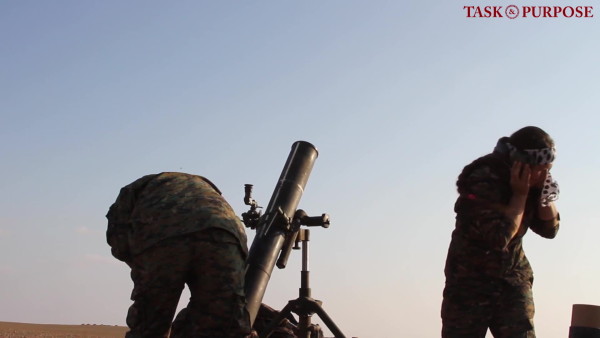

With northeast Syria engulfed in the fog of war, the Turks, Russians, and Kurds have all launched their own propaganda campaigns to win the battle over information.
One of the biggest unknowns at the moment involves exactly how many ISIS fighters and their families previously captured by the Syrian Democratic Forces have managed to escape since Turkey invaded Kurdish-held Syria on Oct. 6, 2019.
But while Defense Secretary Mark Esper has blamed Turkey for catalyzing the release of “many dangerous ISIS detainees”, a senior administration official was unable to say on Monday exactly how many ISIS prisoners may have escaped.
Based on open source reporting, about 850 women and children affiliated with ISIS are believed to have fled a detainee camp at Ayn Issa and another five ISIS prisoners escaped from a prison at Qamishli, said Brandon Wallace, a counterterrorism analyst with the Institute for the Study of War think tank in Washington, D.C.
Both the Kurds and Turks know how important the issue of ISIS detainees is to the West and the wide anti-ISIS coalition, so they are trying to shape media coverage of escapes, said John Dunford, a Syria expert with the institute.
“For the SDF, this means ensuring that they highlight these situations – particularly the breakouts as they are happening – both to say to the West: This is happening, and also that you need to prevent this,” Dunford said. “Turkey, on the opposite, is trying to show to the West that the SDF is equal to ISIS; that they are a terror organization; and that they actually don’t care about this ISIS problem; and they are holding it over the West, essentially.”
To wit: Turkish state media have released a video that purportedly shows Turkish commandos raiding an emptied Kurdish prison in Tal Abyad, Syria. The Kurds have countered that they did not have a prison for ISIS fighters Tal Abyad.
“We have seen similar videos that Turkish proxies have actually conducted in previous operations in 2016 and earlier,” Dunford said. “We do not assess at that point that that was a detention facility that had been emptied that Turkey found.”
“We do believe that it was part of a wider global effort by Turkey to set conditions in the information environment to show the SDF in a bad light to the international community while also showing Turkish actions in a positive light to Turkey’s domestic audience.”
Dunford was unable to confirm or deny reporting by Foreign Policy’s Lara Seligman, that Islamic militia fighters allied with Turkey have released ISIS prisoners as they have overrun Kurdish detention centers.
The U.S.-led coalition against ISIS has reported the SDF has more than 30 facilities in northeast Syria where it is holding ISIS detainees and roughly 15% of the captured ISIS fighters are being within held the area where Turkey wants to establish as a safety zone, he said.
With the U.S. government saying little about the withdrawal of most troops from Syria, Russia has also moved to fill the information vacuum. Russian reporter Oleg Blokhin, posted a video of himself on Tuesday at an abandoned U.S. military outpost in Manbij, leading to some media speculation that Russian private security contractors had moved into the city.
For right now, it appears that Russian military police are in Manbij, but no Russian security contractors have arrived yet, said Mason Clark, a Russian analyst with ISW.
“We do not have any documentation of Russian PMCs on the ground,” Clark said on Tuesday. “The Russians don’t trust Wagner and other PMCs to be the first forces in to recently occupied areas to set up stability operations and control the populace.”
“They will send the actual military police in first to set up checkpoints – that sort of thing, which we’re seeing this morning – and will only send in PMCs: 1. For active combat operations; or 2., in areas that they have a more secure control over.”
Since the Turks began their invasion of Syria on Oct. 9, the person who has most directly shaped the U.S. government’s narrative of events has been President Donald Trump, who has consistently demeaned the Kurds and even suggested that they were intentionally freeing ISIS prisoners in an attempt to force the U.S. military to return to the area.
In a series of tweets on Monday, the president suggested that he was more concerned with securing the U.S.-Mexico border than protecting Kurdish forces, who have fought alongside U.S. troops.
“Anyone who wants to assist Syria in protecting the Kurds is good with me, whether it is Russia, China, or Napoleon Bonaparte,” Trump tweeted. “I hope they all do great, we are 7,000 miles away!”
